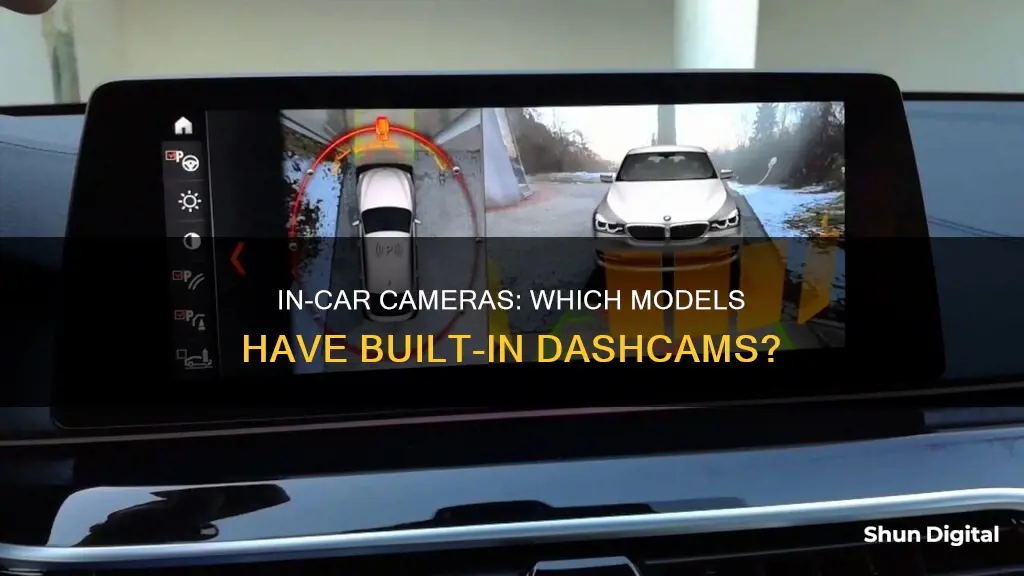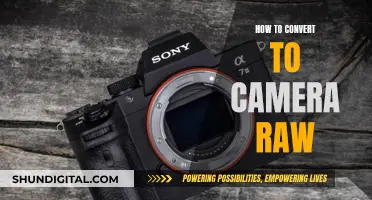
Dash cams are becoming increasingly popular, with a recent survey finding that seven out of ten vehicle owners want built-in dash cameras in their next cars. This demand is driven by consumers' desire for increased safety and security, and dash cams can play a crucial role in establishing liability and fault in the event of a crash. While dash cams were once considered aftermarket add-ons, they are now being offered as built-in features by several car manufacturers. This paragraph will introduce the topic of cars with built-in cameras and provide an overview of the state of the market and the benefits of this technology.
What You'll Learn
- Dash cams are the next big thing in car technology, with over 70% of vehicle owners wanting them in their next car
- Dash cams are useful in the event of a crash, for insurance purposes, and for recording memorable drives
- Dash cams are now being offered as built-in features by carmakers, removing the need for aftermarket installations
- Some car brands that offer built-in dash cams include BMW, Tesla, and Subaru
- Dash cams are not yet widespread due to legal and privacy concerns, as well as the rapid advancement of technology

Dash cams are the next big thing in car technology, with over 70% of vehicle owners wanting them in their next car
Dash cams have been widely used by law enforcement and long-haul truckers for years, but now they are becoming increasingly popular with commercial and passenger vehicles. A recent survey of more than 1,000 vehicle owners found that seven out of ten want built-in dash cameras in their next vehicles. This demand for dash cams is driven by a desire for increased safety and security.
Dash cams are video recorders that continuously capture views through a vehicle's windshield, and sometimes through other windows or the interior. They can be useful in the event of a crash, for insurance purposes, or to record a fun road trip. In the event of a severe crash, a dashcam can establish the sequence of events and record precisely what happened to determine liability and insurance claims. Dash cams can also be used to remotely provide proof that a car has been stolen.
Several car brands already offer in-built dashcam functionality, including Tesla, BMW, Mercedes-Benz, Volvo, and Cadillac. Tesla offers one of the most sophisticated systems, with the ability to record from front and rear cameras, as well as two cameras mounted on the front wings below the side mirrors. The BMW Drive Recorder system can record from up to four cameras simultaneously and offers a new anti-theft feature. Mercedes-Benz's system is not as advanced but still offers dashcam functionality.
Dash cams are becoming an essential accessory for drivers, and with such high interest from consumers, it is likely that automakers will make them widely available in the future.
Home Surveillance Cameras: Effective Security or Privacy Risk?
You may want to see also

Dash cams are useful in the event of a crash, for insurance purposes, and for recording memorable drives
Dash cams are becoming an increasingly popular accessory for drivers. They are video recorders that continuously capture views and sounds through a vehicle’s windshield, and some even record through other windows and inside the vehicle. They are useful in the event of a crash, for insurance purposes, and for recording memorable drives.
In the Event of a Crash
Dash cams can be used to establish the sequence of events and record precisely what happened in the event of a severe crash. This can help to determine liability and fault, especially if the footage is remotely accessible. This can be useful in court or insurance disputes, where the other driver may claim the fault was yours. In this case, dash cam footage can be used as evidence to ensure the other party is held responsible and obliged to pay for any repairs.
For Insurance Purposes
Dash cams can help to lower insurance premiums and deter insurance fraud. They can also be used to prevent insurance fraud, which is a common problem in the 21st century. Some drivers purposely cause accidents to blame the other party and extort money from the victim. Dash cam footage can prevent scammers from illegally extorting money from you for something you haven’t done.
Recording Memorable Drives
Dash cams can be a unique way of recording a memorable drive or road trip, with many models offering a time-lapse recording mode. This is especially useful for those who are fond of road trips and want to turn their journey into an unforgettable memory.
Dash cams are available as aftermarket add-ons, but some car brands such as Tesla, BMW, Mercedes-Benz, Volvo, and Cadillac offer built-in dash cams in their high-end vehicles.
Steady Shots: Stabilizing Your Camera in a Moving Car
You may want to see also

Dash cams are now being offered as built-in features by carmakers, removing the need for aftermarket installations
Dash cams are becoming increasingly popular among drivers, and carmakers are taking note. A survey by research company AutoPacific found that seven out of ten vehicle owners want built-in dash cameras in their next vehicles. This demand is driven by the added security and safety that dash cams provide. While dash cams were once considered aftermarket add-ons, they are now being offered as built-in features by carmakers, removing the need for aftermarket installations.
Several car brands have started offering built-in dash cams, including luxury manufacturers such as BMW, Mercedes-Benz, and Tesla. BMW's "Drive Recorder" system uses surround-view cameras that double as dash cams, allowing drivers to record memorable drives or provide footage in the event of an accident. Similarly, Mercedes-Benz offers dashcam functionality on certain models equipped with its MBUX infotainment system, although it only records from the front camera.
Tesla, known for its innovative use of technology, has also jumped on the dashcam bandwagon. Its "TeslaCam" system uses eight surrounding cameras to assist the driver and can also record and store video footage on a USB drive. Additionally, Tesla offers "Sentry Mode," which activates the car's cameras and sensors when suspicious movement is detected around the vehicle, providing an extra layer of security.
Other car brands that have incorporated built-in dash cams include Subaru, with its "EyeSight" system, and Cadillac, which offered the "Surround Vision Recorder" on its CT6 models until 2019. Chevrolet has also integrated dashcam functionality into its Performance Data Recorder (PDR) in select Corvette and Camaro models, providing both driving analysis and dashcam features.
With the increasing demand for dash cams and the added safety and security they provide, it's no surprise that carmakers are offering them as built-in features. This trend is likely to continue, with more car brands expected to follow suit and offer seamless dashcam integration.
Fight Camera Speeding Tickets: Strategies for New Yorkers
You may want to see also

Some car brands that offer built-in dash cams include BMW, Tesla, and Subaru
Dash cams are becoming increasingly popular in newer cars, with consumers valuing the added security they bring. Some car brands that offer built-in dash cams include BMW, Tesla, and Subaru.
BMW's "Drive Recorder" system is available on several models, including the 7 Series, 3 Series, 8 Series, X5, and X7. The Drive Recorder uses surround-view cameras that double as dash cams. While it doesn't have all the features of a standard dash cam, it can be manually activated through the iDrive infotainment system, recording 20 seconds before and after a collision or other events.
Tesla offers arguably the most sophisticated built-in dash cam functionality in its Model 3, Model Y, Model S, and Model X vehicles. Known as "TeslaCam," the system uses front and rear cameras, as well as two cameras mounted on the front wings, to record footage. In the event of a crash, TeslaCam automatically saves the last 10 minutes of footage. Additionally, Tesla offers "Sentry Mode," which detects and records suspicious behaviour around the vehicle.
Subaru's "EyeSight" system, available on all Subaru vehicles except the BRZ, features two built-in dash cams near the rearview mirror. While primarily designed to assist with safety features such as adaptive cruise control and automatic emergency braking, EyeSight also has dash cam capabilities. In the event of a collision, it records 22 seconds of footage, which can help establish liability and settle insurance claims.
Knock Out Surveillance Cameras: Foolproof Methods to Try
You may want to see also

Dash cams are not yet widespread due to legal and privacy concerns, as well as the rapid advancement of technology
Dash cams are becoming increasingly popular, and they can be extremely useful in the event of a crash, for insurance purposes, or even to record a fun road trip. However, their adoption is not yet widespread, and this can be attributed to several factors, including legal and privacy concerns, as well as the rapid advancement of technology.
Firstly, legal and privacy concerns play a significant role in the slow adoption of dash cams. The legality of using dash cams varies between different countries and regions. While some jurisdictions allow their use, others impose strict regulations or even ban them altogether. For example, countries like Portugal, Austria, and Switzerland have strict privacy laws and have banned the use of dash cams to protect their citizens' privacy. In the United States, there are no federal regulations against dash cams, but issues can arise with recording audio due to varying consent laws across states.
Privacy concerns are also a significant barrier. Users worry that footage containing audio recordings and personal data may fall into the wrong hands and lead to data leaks. While dash cam manufacturers have implemented features like ""loop recording," which automatically overwrite old footage, individuals still fear that their data could be misused. Additionally, there are concerns about capturing footage of other individuals, such as pedestrians, cyclists, and other drivers, without their consent, which could violate privacy laws in certain jurisdictions.
The rapid advancement of technology is another factor contributing to the slow adoption of dash cams. As technology advances rapidly, potential buyers may hesitate to invest in dash cams, fearing that their devices will quickly become outdated. This is especially true considering that dash cams are primarily found in high-end vehicles, making them a more expensive purchase. Buyers may be waiting for the technology to become more affordable and widely available before making a decision.
Despite these concerns, there is a growing interest in dash cams among car shoppers. A survey by research company AutoPacific found that seven out of ten vehicle owners wanted built-in dash cameras in their next vehicles. This demand for dash cams is driven by the increased awareness of personal video and the potential security benefits offered by dash cams, as highlighted by company research analyst Deborah Grieb.
In conclusion, while dash cams offer numerous benefits, their adoption is not yet widespread due to legal and privacy concerns, as well as the rapid pace of technological advancements. However, with the increasing demand for safety and security features in vehicles, it is likely that dash cams will become more common in the future, especially if manufacturers can address privacy and legal concerns effectively.
Accessing TENVIS Camera Footage on Your Computer
You may want to see also
Frequently asked questions
Some cars with built-in cameras include the BMW 7 Series, 3 Series, 8 Series, X5, and X7, the Tesla Model 3 and Model Y, the latest iterations of the Tesla Model S and Model X, the Subaru Crosstrek, the Cadillac CT6, the Chevrolet Corvette, the Mercedes-Benz A-Class, GLE, and CLE, the Toyota Camry, Highlander, RAV4, RAV4 Prime, Sequoia Hybrid, Sienna Hybrid, Tacoma, Tundra, and Venza, and the Genesis G90.
Built-in cameras can be used to establish liability in the event of a crash, help determine fault for insurance purposes, and provide proof of a car having been stolen. They can also be used to record memorable drives or road trips.
Built-in cameras may have limited functionality compared to aftermarket dash cams, such as shorter recording times, less accessibility to footage, and a lack of automatic saving features in the event of a crash. Additionally, privacy concerns have been raised regarding the use of internal cameras that monitor driver behavior.







